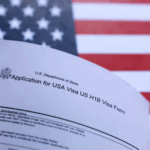
What Every Ghanaian Needs to Know About Getting to and Staying in the United Kingdom.
The UK immigration system has undergone massive changes in 2025, making it both more expensive and more complicated to move to Britain. Whether you’re planning to study, work, join family, or you’re already living in the UK, these new rules will affect you directly. This guide breaks down everything in simple terms.
The Big Picture: What’s Changed?
The UK government has made it clear: they want fewer migrants, especially those earning lower salaries. From July 2025, most work visas now require graduate-level jobs paying over £41,000 yearly. From November 2025, the path to permanent residency (called “settlement” or “Indefinite Leave to Remain”) has completely changed most people will now need to wait 10 years instead of 5 years, and low-paid workers may wait up to 15 years.
For Ghanaians, this matters because Ghana has been one of the major sources of UK migrants. In 2023 alone, Ghanaians submitted nearly 89,000 visa applications. The success rate was 72%, but these new rules will make things significantly harder.
Understanding UK Visa Categories
Let me explain the main ways Ghanaians can enter or stay in the UK:
Visitor Visas (Tourist Visas)
What it is: This allows you to visit the UK for tourism, visiting family, or business meetings for up to 6 months.
The reality for Ghanaians: In 2023, only 54% of Ghanaian visitor visa applications were approved—nearly half were refused. The UK authorities are particularly strict because they worry people will overstay.
Visa Categories
– 6 months
– 2 years
– 5 years
– Priority service
– Super priority
Important rules:
– You cannot work on this visa
– You cannot stay more than 6 months in any 12-month period
– You must prove you have enough money for your trip
– You must prove you will return to Ghana
Student Visas
What it is:If you have been accepted to a UK university or college, you can get a student visa to study there.
Changes affecting Ghanaians: Student visa applications from Ghana dropped by 43% in 2024, partly because the rules became much stricter. However, there have been a recovery in 2025, with visa grant rates for Ghanaians improving to 88%.
New requirements (from January 2025):
– You must prove you have £1,529 per month if studying in London
– You must prove you have £1,171 per month if studying outside London
– English language requirement increased to B2 level (previously B1)
Major restriction:Since January 2024, student visa holders can no longer bring dependants (spouse or children) unless you are doing a PhD or research master’s degree. This is a huge change from before.
Work rights: You can work up to 20 hours per week during term time, and full-time during holidays.
After graduation:You can apply for a Graduate Visa that lets you stay for 2 years (3 years for PhD graduates) to find work. However, the Graduate Visa does not lead to settlement—you will need to switch to a work visa eventually.
Skilled Worker Visa (Work Visa)
What it is:The main route for working in the UK. Your employer must have a sponsor licence and must offer you a job.
The massive July 2025 changes: This visa has become much harder to get. Here is what changed:
Salary Requirements (from 22 July 2025):
– Standard threshold: £41,700 per year (that’s about GHS 570,000 yearly)
– You must also earn at least £17.13 per hour
– Only the first 48 hours per week count—you can not use overtime to meet the salary
For comparison: In April 2024, the threshold was £38,700. Before that, it was £26,200. The salary requirement has nearly doubled in just over a year.
Skill Level:From July 2025, only graduate-level jobs(RQF Level 6) qualify. This means you need a role that normally requires a university degree. About 180 job types that previously qualified no longer do.
Who can apply with lower salary:
– New entrants (under 26 years, recent graduates, professionals in training): £33,400
– PhD holders (if PhD is relevant to the job): £37,500
– STEM PhD holders or shortage occupations: £33,400
Immigration Skills Charge:From December 2025, employers must pay £1,320 for the first year and £660 for each additional 6 months (these fees increased by 32%).
Can you bring family?Yes, but they must pay the Immigration Health Surcharge too, and you must prove you can support them financially.
Path to settlement: After 5 years on this visa, you can apply for Indefinite Leave to Remain (permanent residence)—but see the new settlement rules below, which will require you to earn much more and wait much longer.
Health and Care Worker Visa
What it is: A special route for healthcare professionals—doctors, nurses, care workers, medical lab scientists.
Major change from July 2025: The UK has completely stopped recruiting overseas care workers. You can no longer get this visa as a care worker.
Who can still apply:
– Doctors
– Nurses
– Radiographers
– Paramedics
– Social workers (in certain roles)
– Other health professionals
Benefits:
– You don’t pay the Immigration Health Surcharge
– The salary threshold can be lower than the standard Skilled Worker visa
– You can switch employers in the UK (with a new sponsor)
Restrictions from March 2024:You can no longer bring dependants (spouse/children) on this visa unless you were granted the visa before March 2024.
Family Visas (Spouse/Partner Visa)
What it is: If you are married to or in a genuine relationship with a British citizen or someone settled in the UK, you can apply to join them.
Income requirement: Your UK partner must earn at least £29,000 per year. This increased from £18,600 in April 2024 and may increase further.
Processing time: 12–24 weeks (about 3–6 months)
– Priority service: 6 weeks
What you need to prove:
– Your relationship is genuine
– You have adequate accommodation
– Your partner meets the income requirement
– You both speak English (or you have an English language qualification)
Path to settlement: You can apply for Indefinite Leave to Remain after 5 years on this visa. Spouses of UK citizens and British Nationals (Overseas) are exempt from the new 10-year waiting period.
The Revolutionary Settlement Changes (November 2025)
This is the biggest change to UK immigration in 50 years. The government announced a completely new system called “Earned Settlement” on 20 November 2025.
What Is Settlement?
Settlement (officially called “Indefinite Leave to Remain” or ILR) means you can live in the UK permanently without needing to renew your visa. It’s the step before citizenship.
How Long Do You Need to Wait Now?
Old system:5 years on most visas
New system (coming Spring/Summer 2026):
– Standard routes: 10 years (doubled)
– High earners (over £125,000/year): 3 years (fast-track)
– Low-paid workers (like former care workers): 15 years
– Refugees and asylum seekers: up to 20 years
The Four Pillars You Must Meet
To get settlement under the new system, you must satisfy all four requirements:
1. Character
– Clean criminal record (no convictions)
– No immigration violations
– No unpaid debts in the UK
2. Integration
– Speak English to A-Level standard (CEFR B2 level)
– If you speak English to degree level, you can reduce your waiting time by 1 year
3. Contribution
– Must have earned at least around £12,570 per year for 3–5 years immediately before applying
– Made sustained National Insurance contributions (proving you’ve paid into the system)
4. Residence
– Lived in the UK continuously for the required period (10 years for most people)
– Not been absent for too long
Ways to Reduce the Waiting Time
You can reduce your 10-year requirement if you:
– Speak English to degree level: reduce to 9 years
– Work in public services (teachers, NHS staff in graduate roles): reduce by 5 years
– Earn over £50,270: possible reductions
– Do community volunteering
Example: A nurse who speaks excellent English and volunteers in the community could potentially qualify in 5–6 years instead of 10.
The Benefits Restriction
Huge change: Under the new proposals, you will not be eligible for benefits (government assistance) or social housing until you become a British citizen. Currently, people get access when they receive settlement.
This means even after waiting 10 years for settlement, you would need to wait another year (the citizenship waiting period) before accessing benefits.
Who Is Affected?
The changes will apply to almost 2 million migrants who arrived from 2021 onwards—but there is a consultation about “borderline cases.”
When Does This Start?
– Consultation period: Until February 2026
– Expected rule changes:Spring or Summer 2026
Critical point: If you are already in the UK or planning to come soon, you may still qualify under the 5-year rule if you enter before these changes take effect. Time is essential.
Other Important Changes for November 2025
New Suitability Framework (11 November 2025)
The UK replaced its “old grounds for refusal” with a new “Part Suitability” framework. This creates unified standards for evaluating your:
– Criminal history
– Immigration breaches
– General conduct and character
This applies to all visa categories and even affects applications submitted before 11 November.
Global Talent Visa Expansion
From 11 November, if you’ve won a prestigious international prize, you can get a Global Talent visa without needing endorsement. The list of qualifying prizes has been expanded.
Seasonal Worker Restrictions
– Can only work 6 months in any rolling 10-month period
– Cannot apply if you worked as a Seasonal Worker in the previous 4 months
Digital Changes You Must Know About
e-Visas Are Now Mandatory
From 1 January 2025, the UK stopped issuing physical visa documents. Everything is now digital.
What this means:
– No more visa stamps in your passport
– No more Biometric Residence Permits (BRP cards)
– Everything is accessed through your UK Visas and Immigration (UKVI) account
How to set up your UKVI account:
1. Go to gov.uk/evisa
2. Fill in your details using your passport or BRP
3. Download the UK Immigration ID Check app
4. Use the app to confirm your identity
5. Link your eVisa to your passport
Important: If you are currently in the UK and travel abroad, make sure your eVisa is set up before you leave. Without it, you may have problems re-entering the UK.
Costs You Need to Budget For
Immigration to the UK is expensive. Here’s a realistic breakdown:
For Students:
– Visa application: $630
– Immigration Health Surcharge: £776/year (typically £2,328 for a 3-year degree)
– Proof of funds: £1,529/month × 9 months = £13,761 for London
– Total for visa alone: Around GHS 250,000+ before you even pay tuition
For Workers:
– Skilled Worker visa: £719 (about GHS 14,000)
– Immigration Health Surcharge: £1,035/year
– Immigration Skills Charge (paid by employer): £1,320
– Total: Around GHS 30,000+ for 3 years
For Families:
– Spouse visa: $2,372 (GHS 32,425)
– IHS for spouse: £1,035/year × 2.5 years = £2,587.50
– English language test: around £150–200
– Total: Around GHS 75,000+ just for the visa application
Practical Advice for Ghanaians
If You’re Planning to Study in the UK:
Good news: Student visa approvals for Ghanaians improved significantly in 2025, with an 88% success rate.
Tips:
– Apply early—processing takes 3 weeks
– Gather all financial documents carefully
– Prove your English level clearly (B2 required)
– Consider that you cannot bring family unless doing a PhD or a research master’s degree
– Plan your finances: you’ll need proof of at least £10,000–15,000 in savings
– Remember you can work 20 hours/week, but do not rely on this for living expenses
After graduation: The Graduate Visa gives you 2 years to find a Skilled Worker sponsor, but with the new salary thresholds (£41,700), finding a qualifying job is much harder.
If You are Seeking Work:
Reality check: The new £41,700 salary threshold means most entry-level graduate jobs no longer qualify. You need a job that:
– Requires a degree
– Pays over £41,700 (or £33,400 if you qualify for a discount)
– Is with an employer who has a sponsor licence
Healthcare workers: If you are a qualified nurse or doctor, this route is still viable, but care workers can no longer apply from July 2025.
Strategy:
– Get your qualifications recognised in the UK first
– Target employers with sponsor licences (check the UK government’s list)
– Consider gaining experience in Ghana first to command a higher salary
– Network with Ghanaian professionals already in the UK
If You are Planning to Join Family:
Jey requirement: Your partner in the UK must earn £29,000+. This may increase further.
Tips:
– Gather 6 months of your partner’s payslips
– Get a letter from their employer
– Prove your relationship is genuine (photos, messages, joint finances)
– Show you have adequate accommodation
– Book your English test early
– Expect 3–6 months processing time
If You are Already in the UK:
Critical action: Understand how the new settlement rules affect you.
If you arrived after 2021: You will likely face the new 10-year requirement when it comes into force in 2026. However, there may be transitional arrangements.
Strategy:
– Start improving your English to degree level now
– Increase your salary above £50,270 if possible to reduce your waiting time
– Keep detailed records of your National Insurance contributions
– Stay compliant with visa conditions
– Consider volunteering or working in public service for time reductions
Financial planning: You’ll need to earn at least £12,570/year for 3–5 years before applying for settlement. Start saving now, as the application fee for ILR is currently around £2,885.
Visitor Visa Applications:
Reality: Only 54% of Ghanaian visitor visas are approved.
To improve your chances:
– Prove strong ties to Ghana (employment, property, family)
– Show substantial savings in a Ghanaian bank account
– Provide a detailed itinerary
– Get invitation letters from UK hosts
– Demonstrate a clear intention to return
Common Mistakes to Avoid
1. Underestimating costs: The visa fee is just the beginning. Factor in IHS, travel, accommodation deposits, and living expenses.
2. Applying too late: Processing times are long. Apply at least 3–6 months before you need to travel.
3. Incomplete documents: Missing a single document can lead to refusal. Use checklists.
4. Lying or exaggerating: The UK shares information with Ghana and other countries. False information leads to automatic refusal and a 10-year ban.
5. Not understanding English requirements: Different visas need different levels. B2 is now standard for most routes.
6. Ignoring the new settlement changes: Don’t assume you will get permanent residence after 5 years if you arrive after 2026.
7. Overstaying visitor visas: This leads to a ban and makes future applications nearly impossible.
The Statistics—What’s Really Happening
In 2023: 89,000 Ghanaians applied for UK visas; 72% were successful
– Visitor visas: Only 54% approved (21,554 grants vs 18,186 refusals)
– Student visas: Dropped 43% in 2024 but recovering in 2025
– Family visas: 81% approval rate (2,294 grants from 2,815 resolved cases)
What this tells you: Family visas have the highest success rate. Visitor visas are the hardest to get approved. Student visas are improving but still competitive.
Looking Ahead—What to Expect
The UK government’s message is clear: immigration will continue to get stricter. Expect:
– Further salary increases
– More employer restrictions
– Longer settlement periods
– Higher costs
The consultation closes in February 2026, and new rules will take effect in Spring/Summer 2026. If you are planning to move to the UK, the time to act is now, before these changes fully take effect.
Final Thoughts
The UK remains an attractive destination for Ghanaians, but the window is narrowing. The key is to:
– Be realistic about your eligibility
– Budget properly (expect at least GHS 50,000–100,000 minimum)
– Seek professional legal advice for complex cases
– Act quickly if you want to benefit from current rules
– Consider alternative countries if you do not meet the new thresholds
Remember: Immigration rules change frequently. Always check the official UK government website for the latest information before making any decisions.
Good luck with your UK immigration journey.
This guide was prepared in November 2025 based on the latest available information. Immigration rules change regularly, so always verify current requirements before applying.




